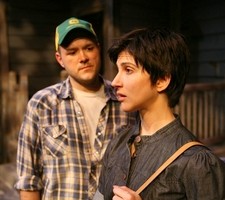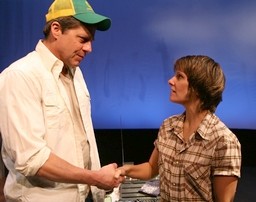|
Harvest
Theatre Review by Cindy Pierre

Judson Jones and Christa Kimlicko Jones
Photo by Trevor Oswalt Photography.
|
In today's society, men typically acquire material possessions to get the girl: the nice car, the nice house, and the nice investment portfolio are all desirable lassos. Yet, in 1961, it was the material possession itself, or rather, the obsession over it that tore a couple apart in David Wright Crawford's Harvest. In it, farm-owner Rick Childress must make a painful decision between the land and legacy that has survived and thrived in his family for generations and his beloved and vivacious wife Toni. His weighty decision proves to be one that delineates the next 45 years of his life. Crawford crafts a three-act narrative about a loner dedicated to his crops, perpetually waiting for the yield of his labor and investment. And in so doing, he also awaits the return and the mending of his heart.
Born and bred farmer Rick Childress first appears to us in his twenties, tentative about selling his family-owned house and cotton farm. After 5 years of marriage, his university-educated, impulsive and adventurous wife Toni wants to move to the city where the rigors are less severe and the luxuries are plentiful. Wearing the same glow from the previous night's intimate chats, Toni expresses her joy about Rick's decision to sell the farm and move to Dallas. Toni invites Copeland (Doug Sheppard), a neighbor and prospective buyer, to come over to negotiate the terms, but Rick isn't quite ready to broker a deal. The toil and trouble on young Rick's face, played by Judson Jones, pricks her happiness and her dreams. Rick reneges on his promise, and they engage in a heartfelt battle of wills, emotions and dreams, culminating in Toni leaving with nothing but a small suitcase and her determination to have more and get more. As the young Toni, Christa Kimlicko Jones communicates an exuberance and zest for life that warms the stage and makes Rick's choice unbearable. Jones' indecision reverberates throughout his body and face, and his Rick is sensitive, but steadfast in his reluctance to sell. He operates with two hearts, one belonging to his doting wife, and the other belonging to his land. And although Toni's departure is heartbreaking, his need to maintain his cherished property and his pride, which are one and the same, is admirable. As Copeland, the buyer without any hope of a purchase, Sheppard has very little to do. Act One is an impressive display of domestic tension, and a complete work. Harvest could have easily ended here, making it a strong, one-act drama.

Jeremy Stuart and Shorey Walker
Photo by Trevor Oswalt Photography.
|
Act Two opens 20 years later without any changes to the scenery, and without any softening in Rick's resolve. Except now, he is withdrawn completely from social activities, making him a hardened, lonely hermit with a poetic soul. He hires Rafael Lamas (Morgan Baker), a good-natured, presumptuous farmhand to help him manage his crops. Now in his forties and set in his ways, there doesn't seem to be a break in sight from his routine until Aggy Taylor (Shorey Walker), an enthusiastic county extension agent, visits his farm for an inspection. Rick (Jeremy Stuart) is resistant to Aggy's presence at first, balking at the invasion in his privacy, but he soon caves in to her agriculturally-savvy, impetuous charm. The pair also learns that they connect on the issue of loss, as Aggy is dealing with the death of her husband and seeking a new beginning. The wonderful dynamic between Walker and Stuart allows for engaging (although sometimes dry) dialogue between one who is in arms and one who is disarming. Walker is part Hilary Swank, part Jodie Foster, and part Reba McIntyre, exhibiting a vibrancy and determination to chip away at Rick's tough husk. Because Aggy is here of her own volition and passion whereas Toni was on the farm with Rick solely because she was devoted to him, she is a more practical match for Rick. Act Two concludes with hope, understanding, and a burgeoning relationship. It also corroborates the initial impression of Act One as an independent piece.

Richard Mawe and Kathleen Huber
Photo by Trevor Oswalt Photography.
|
The final act creeps by in a manner that would suggest the matching of the characters' ages. Rick (Richard Mawe), now in his early seventies, is still planting cotton, but the business has returned to a one-man operation. Once again, he is being urged to sell the farm, this time by his caring daughter by Aggy, Maggie (Kymberlie Stansell). While deliberating over retiring and moving in with his daughter and her husband, Toni (Kathleen Huber) returns to the farm to see him. It is a happy reunion, one filled with nostalgia, happiness and acceptance. Mawe is the perfect Rick in his senior years, sullen, pensive, and more confident than he's ever been. Huber picks up Kimlicko Jones' mannerisms and joie de vivre to a diminished degree (and rightfully so due to age), but she creates the link between the consecutive acts, making them one body of work.
Harvest is a heartfelt drama, dense with emotion, strength of character and sacrifice. Under the sharp co-direction of Bernard Cummings and Judson Jones, the cast relate a raw depiction of commitment and fulfillment. From the exciting, stormy intro by lighting designer Jessica M. Burgess and composer/sound designer Scott O'Brien to the quiet ending, this production by Alchemy Theatre Company of Manhattan is relentless in painting the portrait of an emotionally frayed, but devoted and unwavering man. Although the set itself does not reek of farm life with few visual aids for Rick's passion, the homage to a simpler, hardier way of life is clear. Each act seems formulaic with three characters each, but it's a formula that works for Rick's solitude. Harvest presents farming as a declined, but still valuable way of living, and there is great pride in this testimony. Although the final act overstays in running time, the lingering respect for farming and its provisions is clear. For Rick, farming is not only a respectable way to take care of family. The notion of family is so strong here that we are returned to a time when having children out of wedlock was unheard of. It is also a deep well of comfort, responsibility and love. Rick's first love may be material, but it is not one that anyone can say is shallow or absurdly selfish. That careful balance of reverence for work and manhood is the very thing that makes Harvest a substantial production that deserves to be seen. If you have ties to something that defines you more than another human being ever can, Harvest will be even more poignant for you still.
Harvest
Through December 23
Beckett Theater, 410 West 42nd between 9th & 10th Avenues
Tickets online and current Performance Schedule: TicketCentral
|
